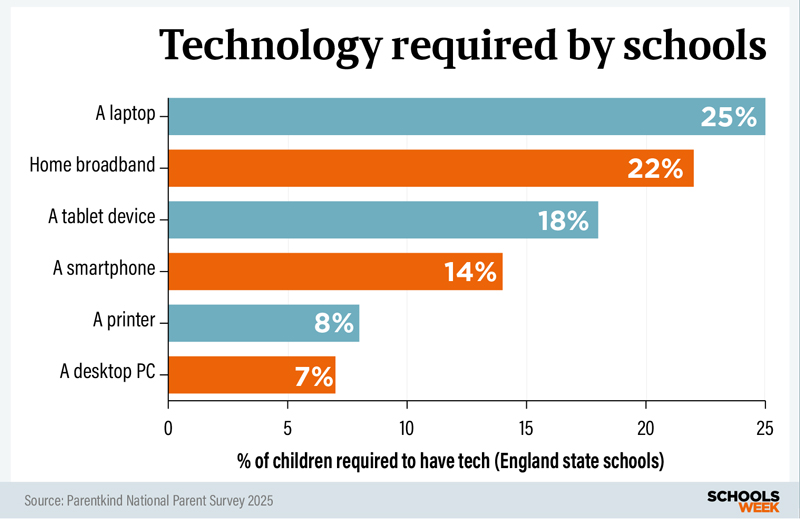Ofsted chief inspector Sir Martyn Oliver has criticised schools that require parents to buy technology for their children – saying they have “a duty” to deliver the curriculum without expecting families to shoulder additional costs.
Parentkind’s annual national parent survey, published last week, revealed that four in 10 pupils are required by their school to have a laptop or tablet.
Nearly one-third (31 per cent) of primary-aged pupils are required to have an electronic device, the survey of 5,800 parents found, while half of children eligible for free school meals have been told they need a laptop or tablet by their school.
In last year’s survey, 27 per cent of parents cited technology as a leading cost concern.
Oliver told a Parentkind event last week that he was “really shocked” by the findings.
“You cannot and must not expect, as a headteacher, to ask for additional resource of parents to buy something to deliver the state’s free education system.
“And that is guidance that all headteachers are well aware of… schools have a duty to make sure that’s entirely accessible.”
Parentkind chief executive Jason Elsom said that “expecting [parents] to provide laptops, tablets and other devices for learning” amounted to “a technology tax”.
He added: “Families already stretched to the limit are being pushed into heartbreaking choices between buying the tech their child needs and putting food on the table or keeping the heating on.”
Schools ‘bridging the gap’
Thorpe St Andrew School, in Norwich, asked parents last year to buy £300 Chromebooks for new pupils, but scrapped the request following a backlash.
Owen Jenkins, CEO of the school’s trust, Broad Horizons Education Trust, said the idea was proposed amid an “extremely volatile school funding climate”. His trust was offered a government loan after posting an overall deficit of £670,000 last year.
But Jenkins agreed that schools “have a duty to make sure every child can access the curriculum”, adding: “That increasingly includes access to technology.”

Ninety per cent of teachers use technology for homework, according to research published by the Department for Education in 2023, with 48 per cent using it “a lot of the time”.
Elizabeth Anderson, CEO of the Digital Poverty Alliance, said requiring pupils to own tech to study “asserts digital access and connectivity as the metric for academic success”.
But James Bowen, assistant general secretary of school leaders’ union NAHT, said that, as technology is now “a common feature” in most homes, “it is understandable that schools will look to harness that to support with homework and schoolwork”.
However, he added that schools “are acutely aware of the financial challenges many families face, and many have schemes in place to support pupils who may not have easy access to a device at home”.
Concerns raised by opposition
Shadow education secretary Laura Trott raised the issue of schools “charging parents for mandatory laptops or IT equipment used during school hours” in parliament in July.
The MP for Sevenoaks, in Kent, was approached about a school that was requiring pupils to have Chromebooks, her office said.

These were being supplied for those on pupil premium, but not for other students. It is understood the idea was later scrapped.
Responding, former early education minister Stephen Morgan said guidance on the issue “is clear that there should be no charge for state-funded education”.
He said the Education Act “prohibits schools from charging… for the supply of materials, books or other equipment, like laptops or IT equipment, that are required for education during school hours”.
However, Morgan added that schools “may ask parents to make a voluntary contribution towards the cost of equipment but must make clear that these are voluntary”.
Jenkins said that schools were “facing significant and ongoing unfunded pressures” and are “constantly having to look at all possible options to balance budgets while still providing the best opportunities for our pupils”.
He added: “Our focus now is on ensuring that all children have access to the technology they need, but the reality is that, when funding does not stretch far enough, schools are left trying to bridge the gap.”
Calls for government to do more
Pointing to the government’s steps to limit the cost of school uniforms, Elsom said: “Technology must be next.”
Pepe Di’Iasio, general secretary of leaders’ union ASCL, called for a “far more ambitious” strategy for digital investment in education. Current funding to close the digital divide is “nowhere near enough to ensure that every child is supplied with a device in the future”, he said.
Anderson added that policy and funding “must ensure device access [and] reliable connectivity… are built into how the education system delivers curriculums, with offline options offered until that happens”.
Kate Anstey, head of education policy at Child Poverty Action Group, warned that “the government must also deliver on its promise to spread opportunity by ensuring families have enough money to give kids a good start”.
Oliver also cited schools he had taken over while previously leading the Outwood Grange Academies Trust that had “an iPad for every child” but were “always in special measures”.
He said such schools were “putting too much attention” into a “nirvana toy rather than [delivering a] high-quality, knowledge-rich curriculum”.
The DfE was approached for comment.







The government is promoting AI as a solution to many of the challenges in education. However, without pupils’ work being digitised, AI will have little real impact. If the government believes parents should not be expected to pay for devices, then it must step up and fund the digital future of education. At present, it is sending out a contradictory message. AI has the potential to deliver truly personalised learning, but this can only be achieved if education itself is digitised.
The exam boards are looking to move to increasingly digital exams. School funding is at desperate levels and students do need access to technology to prepare for the job market. The sums for schools do not add up
18 Months ago my child’s Newly academised single form entry school added a raft of non teaching staff with executive principles and a director of learning added and travelling over a hundred miles and lodging etc.
A few months later they asked for donations of glue sticks, PVA, sellotape, card and craft materials timetable the children to do craft activities in school.
It was pointed out that if they spent less on executives and directors they might have money for basic equipment. It was also suggested the 17 people earning over £100k or 4 earning over £200k at the MAT might be better able to afford these items.